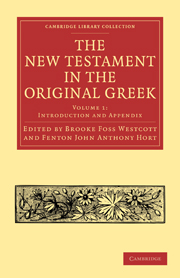Book contents
INTRODUCTION
Published online by Cambridge University Press: 29 August 2010
Summary
1. This edition is an attempt to present exactly the original words of the New Testament, so far as they can now be determined from surviving documents. Since the testimony delivered by the several documents or witnesses is full of complex variation, the original text cannot be elicited from it without the use of criticism, that is, of a process of distinguishing and setting aside those readings which have originated at some link in the chain of transmission. This Introduction is intended to be a succinct account (i) of the reasons why criticism is still necessary for the text of the New Testament; (ii) of what we hold to be the true grounds and methods of criticism generally; (iii) of the leading facts in the documentary history of the New Testament which appear to us to supply the textual critic with secure guidance; and (iv) of the manner in which we have ourselves endeavoured to embody the results of criticism in the present text.
2. The office of textual criticism, it cannot be too clearly understood at the outset, is always secondary and always negative. It is always secondary, since it comes into play only where the text transmitted by the existing documents appears to be in error, either because they differ from each other in what they read, or for some other sufficient reason. With regard to the great bulk of the words of the New Testament, as of most other ancient writings, there is no variation or other ground of doubt, and therefore no room for textual criticism; and here therefore an editor is merely a transcriber.
- Type
- Chapter
- Information
- The New Testament in the Original Greek , pp. 1 - 3Publisher: Cambridge University PressPrint publication year: 2010First published in: 1881
- 1
- Cited by



